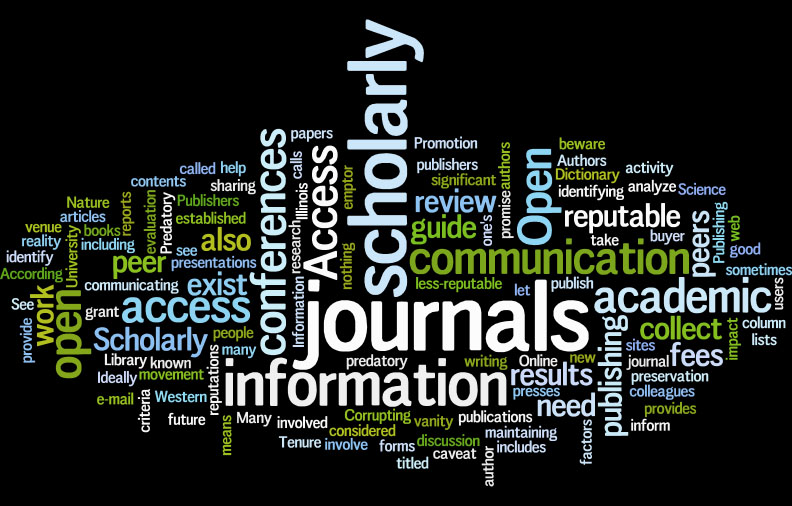
Scholarly Communication
Scholarly communication is the means by which people involved in academic research and creative activity inform colleagues about the results of their work (Reitz, 2014). According to the Online Dictionary of Library & Information Science (ODLIS), scholarly communication can take many forms, including writing books, journal articles or grant reports; conference presentations; maintaining academic web sites and communicating with peers through e-mail and discussion lists. Ideally, scholarly communication should involve evaluation by one's peers (peer review) and preservation of the work for future users.
An article by West & Rich (2012, linked below) states that journals should be chosen based on their rigor, impact and prestige. These criteria could also apply to choosing a conference or book publisher.
Open Access
The Open Access movement, which promotes free access to information through the Internet, has had a significant impact on scholarly publishing. Journals have evolved so that their contents are available online rather than in print. Many new publications have been established that provide access to their contents on the Internet; articles and even books are made freely available online so that they can be read and used by anyone. Authors can provide open access to their publications by paying a fee to publishers so that their publications are openly accessible or posting pre-prints or post-prints of journal articles; conference publications or presentations; or even books in digital institutional or subject repositories. Digital Repositories are “digital collections of books, papers, theses, media, and other works of interest” that are preserved and disseminated by institutions and/or organizations (Reitz, 2014).”
Predatory Publishers, Journals & Conferences
In the last few years, questions have been raised about Open Access because of the rise of predatory publishers, journals and conferences, which exist to make money from author fees and conference registrations rather than promote open exchange of information about scholarly activity. While some open access journals have excellent reputations, others are nothing more than vanity presses; they exist to collect fees from academics who need to publish. Legitimate publishers commit their money and the time of their employees and volunteers (editors and peer-reviewers) to evaluate and ultimately disseminate information, as journal articles or books. Predatory publishers, like vanity presses, require authors to pay a fee for publishing, and may not provide adequate evaluation or peer review before an article is published. For more information about predatory publishing and conferences, see the column in Nature titled "Predatory Publishers are Corrupting Open Access,” the editorial by Jonathan Sweedler titled "Buyer Beware! Think Twice When Selecting a Journal (Or Attending a Conference)" or the article in the Ottawa Citizen "Fake Science Publisher Accepts (again) a Paper Already Exposed as a "Pile of Dung.'" These articles point out the need to evaluate journals and conference invitations carefully before publishing or attending.
Predatory publishers and fraudulent conferences often recruit editors, authors and participants through unsolicited (spam) e-mails. Articles in predatory journals often receive little or no peer review. Articles are published as long as authors pay an author fee; in some cases, authors are not informed of the fee until the article has been through a cursory peer review and accepted. Some predatory publishers also organize fraudulent (predatory) conferences, although fraudulent conferences can also be organized by other groups.
This guide provides information on identifying a reputable venue for sharing the results of scholarly activity. It includes information on the Tenure & Promotion criteria here at Western Illinois University and other factors that should be considered to help identify reputable conferences, journals and publishers. If you have any questions or need assistance, please feel free to contact your Library Liaison or Linda Zellmer. For more information on open access, see the guide on Scholarly Publishing and Open Access.
Reitz, Joan M., 2014. Online Dictionary for Library and Information Science (ODLIS). ABC-CLIO.
Sweedler, Jonathan V., 2013. Buyer Beware! Think Twice When Selecting a Journal (Or Attending a Conference). Analytical Chemistry, v. 85, no. 21, p. 9983.

